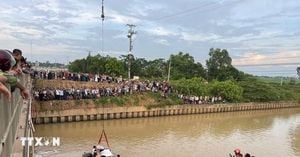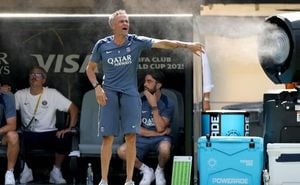Alice Weidel, the leader of the Alternative for Germany (AfD), recently sparked significant discussion during her appearance on the ARD show hosted by Caren Miosga. The interview, broadcast on January 26, 2025, delved deeply not only with Weidel's views on the Holocaust but also with the party's controversial policies aimed at migration and energy.
At the outset of the show, Miosga confronted Weidel with pressing questions about the AfD's engagement with Holocaust remembrance. "How does the AfD approach the memory of the Holocaust?" she asked pointedly. Weidel distanced the party from the acts of the Nazis, asserting, "the entire association of the Holocaust with the AfD is tedious." She openly stated, "For us, the existence of Israel takes priority," aiming to affirm the party’s position against anti-Semitism.
Throughout this discourse, Weidel claimed to have applauded during memorial ceremonies for Holocaust victims held within the Bundestag, emphasizing the party's recognition of historical atrocities. Yet, Miosga challenged this assertion by highlighting past statements from Weidel where she expressed skepticism about the commemoration of the 'day of liberation from Nazism' as culturally significant. Weidel's past remarks, according to Miosga, hinted at her discomfort with what she termed the "Schuldikult"—a term used within right-wing circles to criticize what they view as excessive guilt over Germany's Nazi past.
The discussion took another turn when Miosga referred to Weidel’s comment, which indicated the need to move beyond this "culture of guilt." "When do we finally stop being held captive by our history?" she paraphrased Weidel as saying. The AfD leader deflected the critique, arguing, "This endless discussion hints more at framing than at addressing real issues. The AfD aims to solve the actual problems facing Germans today, such as uncontrolled migration," she insisted, making migration a central theme of the interview.
Robin Alexander, joining Weidel on the panel, interjected with skepticism about her proposed solutions and the party's policies on energy. The debate escalated when Weidel declared her opposition to extending funding for wind energy projects. An impassioned audience member rebuked her statement with cries of "Bullshit!" prompting Alexander to urge for civil discourse. He pointedly remarked, "Weidel should not be interrupted when she is invited to discuss her views," yet he later criticized her plans to dismantle existing wind farms, arguing it wouldn't be effective. Weidel contended her suggestions were metaphorical rather than literal, attempting to clarify her intentions.
The focus shifted toward energy policy, particularly concerning the Nord Stream pipelines. Weidel suggested rekindling imports of gas from Russia, prompting Alexander’s reminder of the damaged pipelines due to geopolitical tensions. This led to questions about her vision of closer ties with Russia juxtaposed with the aspirations of US figures like Elon Musk and Donald Trump, with Weidel stating her intent was purely to prioritize Germany's interests.
The political backdrop intensified as Weidel's interview unfolded against the looming backdrop of the upcoming Bundestag elections, where the AfD has been polling as potentially the second strongest party following recent votes on migration policy. The AfD has gained traction partly due to its controversial stances supported by global figures like Elon Musk, which Miosga noted during the show, stating, "Musk encouraged Germans to leave behind their culture of guilt, sparking criticism even from international leaders like Donald Tusk." Weidel dismissed Tusk's critique, referring to him as "just another leftist."
More broadly, Weidel's vision as proposed during the show encapsulated the AfD's call for reduced EU powers. "We are fundamentally for retraction of competencies from the European Union," she asserted, calling EU governance "overreaching." She declared her belief, echoing sentiments expressed throughout the interview, pushing for Germany to shed the label of being a "slave state," as previously expressed, demanding respect for its sovereignty. "We need to make Germany stronger, not shyer about its history," she concluded.
The interview managed to underline Weidel's attempt to navigate the sensitive waters of Germany's Nazi history, political accountability, and the future direction she envisions for her party and country, yet it left little room for consensus with her critics present on the panel. Miosga's and Alexander's inquiries bore witness to the tension between historical reflection and political ambition, as the AfD continues to challenge the mainstream narrative with assertive rhetoric. The absence of resolution by the end of the broadcast highlighted the growing divide within German politics—a divide seemingly embodying the current climate of political polarization.



